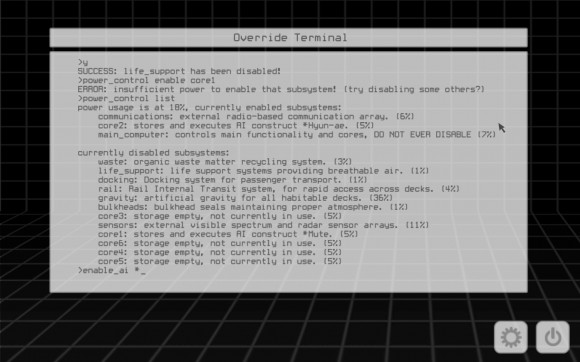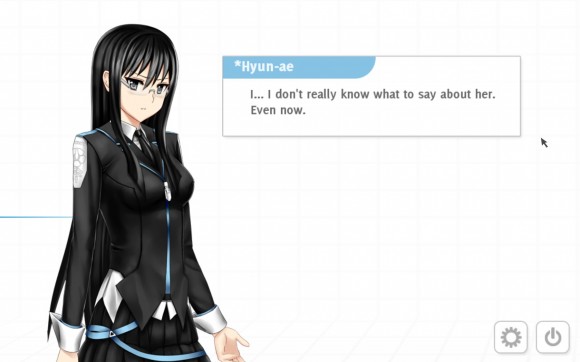I was a little shocked to discover that I wrote about Don’t take it personally babe, it’s just not your story, the previous game from indie developer and writer Christine Love, all the way back in May 2011. It’s a fascinating game, replete with interesting successes and failures, that still occasionally plays on my mind. Perhaps that’s why I thought it was released more recently than eighteen months ago.
Analogue: A Hate Story appeared earlier this year; its title is intended to represent a thematic inversion of Love’s first game Digital: A Love Story. That would be an interesting thing to explore, wouldn’t it? The juxtaposition of these antithetical themes? Why yes it would, dear reader, but I’ve still not actually played Digital, so instead I’m just going to talk about Analogue.
The game opens with a simple message instructing the player, who is some sort of freelance starship pilot who investigates derelicts, to head for a drifting generation starship which has been lost for six hundred years. No one knows what happened to the ship or the people onboard. Your job is to find out.
It doesn’t spoil much to say that, after a nice bit of fake command line jiggery-pokery to reboot systems, you come face to face with a ship’s artificial intelligence, which proceeds to grant you access to datalogs and engage you in conversation. Through these datalogs and conversation with the AI, new logs will be unlocked and new information will become available – including the secrets of what happened to the ship and its residents.
Here ends the spoiler-free segment. It’s uninteresting to talk about Analogue: A Hate Story without mentioning anything more about it; information that is necessarily new to the player as she or he unpicks the story of the ship. If you hope to play the game, stop reading here and do so.

Still with us? Okay.
For those of you who haven’t played the game and are still reading despite my caution not to, the ship known as the Mugunghwa has been dead for the majority of those six hundred years. The AI you first encounter is *Hyun-ae, who is an improbable ship’s AI in that she appears girlish and young and overly eager for approval. One of the game’s first real twists, albeit one that is very easy to see coming, is that *Hyun-ae is not really an AI. Or at least, she wasn’t: originally she was a girl aboard the Mugunghwa who was uploaded to the ship’s computers upon her death.
The real Hyun-ae was a survivor of another era: at her time the Mugunghwa was populated by a Korean society comparable to present day South Korea. Unfortunately for Hyun-ae she was terminally ill with an incurable illness, so her father made the difficult decision to lock her in stasis until a cure could be found. Tragically, after the death of Hyun-ae’s family the Mugunghwa underwent severe social regression – a scenario familiar to many science fiction stories about generation ships – resulting in its society being in many ways pre-modern. This includes limited understanding among most people of the technology that sustains them and where they are, but also involves an exceedingly patriarchal society that has very strict and narrow roles for women. The teenage Hyun-ae is rudely dragged from a world in which she had a loving family and personal freedom, into another where she is to be bargained off in marriage for political expediency, where her independence and free thoughts is regarded as incomprehensible, and where even the written language has changed.
It is Hyun-ae’s perspective that allows the player to understand the setting of the Mugunghwa; she is the narrative lens that gives us focus. This focus lies on Hyun-ae’s own experience – the powerful alienation of being an outsider in a rigid and inflexible society; her internalisation of pain and sorrow; the few moments of happiness and friendship she manages to snatch; the knowledge that she will soon die and cannot even convince her new family or husband of this face – but also on the patiarchal society that has regressively grown. By Love’s own admission this society is based very specifically on the history Joseon Dynasty of 14th to 19th-century Korea. It is equal parts exploration and critique and those with an interest in history, social justice or gender dynamics will likely find this aspect of the story engaging and intriguing – and occasionally harrowing.
The dragon of cultural appropriation may raise its ugly head, in that Christine Love is a Caucasian Canadian telling a story set in what is effectively two Koreas; the historically-rooted society and the more modern, post-war Western-liberalised culture. It’s difficult for me to write about these aspects of it as a white, male, cissexual westerner; sexuality is another big part of the story, and primarily from a woman’s perspective to boot. My perspective on the game’s social themes is ultimately less valid than that of someone to whom the story speaks more strongly from and to.
But regardless it’s fascinating because it presents such an unusual – to me – setting and perspective, and such an emotionally powerful and resonant experience to – let’s be honest – holiday within. The game evokes a sense of powerlessness, of the horror that can be done to the individual by a society, of injustices that cannot be fought free from because their justness is unquestioned: this is what it would be like to be a woman in the historical society Love reproduces in Analogue’s setting.
Is that emotional tourism in victimhood? Perhaps. But the story isn’t only told from Hyun-ae’s perspective: a second AI, *Mute, can be activated. She was programmed with the values of Joseon-esque society internalised. She despises Hyun-ae and defends some actions of the society the girl was brought into. It is difficult to argue that there can be balance here, with misogyny so deeply socially rooted, but there is always humanity – weakness and kindness as well as cruelty and ignorance – to be found. Indeed, Love reportedly found writing *Mute a difficult experience as a result of the AI’s role as an apologist mouthpiece, but over time found aspects of her personality to be sympathetic towards.
I would imagine that Analogue is a powerful artistic representation of what it can be like to be a woman in the world today. Not in its extremities, perhaps, not in the same ways. But it can be a matter of degrees, or simply a matter of attitude: of being ignored, marginalised, spoken for, shamed. I imagine many elements of the experiences Analogue presents speak to many modern women. But I can’t say as much myself. How could I?
I would rather read women writing about these aspects of the game, if I’m an honest. AÂ lot of men have written about Analogue: A Hate Story, which is good if it means the game is being widely played. But I set out to find some coverage from female writers, and if possible Korean writers (writing in English). I struggled a bit. Does my Google-Fu just suck? If not, why aren’t more game review outlets inviting female writers to offer their take on this kind of game? Is this a conspiracy, a deliberate black satire on how patriarchy goes unnoticed and unmentioned until it is too late?
Possibly a mix of the above. Still, here is a lengthy piece on Kotaku by the profilic writer Patricia Hernandez. Here is a translated comic strip review of the game by a Korean player (original). And here is an interview with Love herself. Finally, here is Leigh Alexander writing about how Analogue (as well as Love’s other games) are situated in a possible new space of “relationship games”.
Maybe we’ll talk more about this part of the game in the comments.

One final note. I have read, in reviews, the criticism that players must randomly present logs to the AIs in order to unlock new information to proceed. This is wrong. Not in terms of being untrue, but in terms of how it misunderstands the actions of playing the game. Analogue: A Hate Story shouldn’t be played to progress. It should be played in order to learn more about a forgotten history; to unpick the truth of a story that has been forgotten. It is interactive fiction; the rules of novels apply here. No one reads a book to get to the next page. It is the journey that is significant.
That this journey also happens to be interesting effort to tell a futuristic, SFnal story as well as recount what life was like in an ancient culture, and further manages to cohere these different elements into a thematically consistent and emotionally resonant experience is impressive.
And there are five endings! I’ve only revealed three so far. The others… one I suspect is essentially a failure ending. The fifth, the ultimate ending… I can barely imagine how it’s obtained. It must ramp up those “relationship gaming” elements to the Nth degree, forcing oppositional characters toward some middle ground. Regardless, the approach to learning the full story behind the story of the Mugunghwa lies in replaying the game: those who really fall in love with this story can read it again and again, refining and bolstering their understanding rather than their reflexive or tactical skills. That’s a power it is unusual for a game to exhibit.
Comments
3 responses to “Analogue: A Hate Story”
Thanks for writing this! As another white straight cis male who loved this game, I too am waiting to hear commentary on it by members of the groups it speaks to. I felt like I learned a lot by playing through Mute's dialogue once as a man, and once as a woman – I remember being really unsettled by how the tone of her dialogue changed.
And absolutely, go play Digital.
It's really interesting to me that you interpreted those binary choices about presenting yourself as playing that role. This didn't even occur to me: I interpreted anything other than my honest opinion as lying to the characters!
I suspect a lot of said commentary is out there, but it may not be too obvious to those of us accustomed to… dominant channels of videogame news 'n views.
Thanks for stopping by and commenting, glad you found something to like about the article. And yes, I really must play Digital…
[…] The actual episode I appear in is here. It is a bit of a shame Craig and Mike were unable to get AJ to appear instead, since he’s the man who watches bad videogame films so we don’t have to. Fortunately I had enough time to watch one film as research. Unfortunately I chose Max Payne. So it goes. At least I managed a world-exclusive teaser of the film adaptation of Analogue: A Hate Story! […]